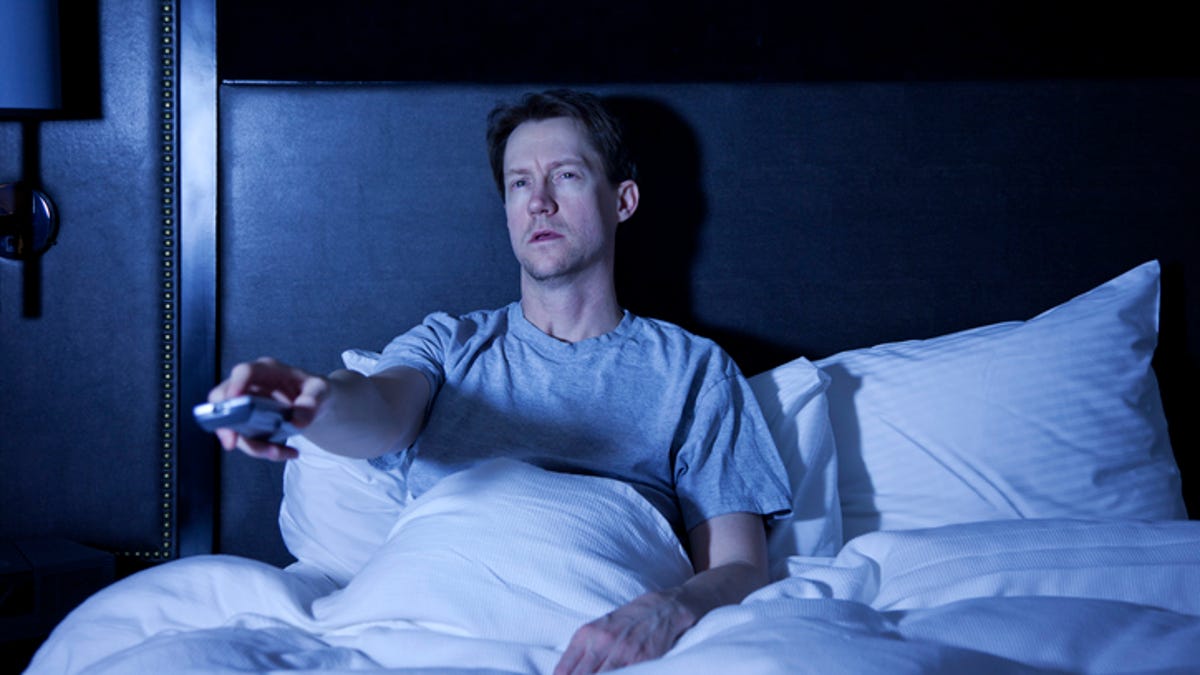 Why You Can Trust CNET
Why You Can Trust CNET Stop Watching TV to Fall Asleep. Do This Instead
Watching TV is one of the most common ways to nod out at night. But it's probably messing up your sleep. Here are my top alternatives.

In a perfect world, falling asleep would be as easy as closing your eyes. But more often than not, that isn't how it goes. So we resort to scrolling through social media or watching TV until we're tired enough to conk out.
Most people know that's bad for quality sleep. Blue light comes off TVs and phones and halts our melatonin production. Melatonin is a key hormone our brain produces as the sun sets and it's time to get ready for bed. Blue light throws off that natural process.
Getting in bed and choosing to go to sleep doesn't work for me. I need something going on. It may be anxiety or just a habit at this point. Here's the thing, watching TV at night was ingrained in me before I knew it was bad. So I'm stuck between a rock and a hard place. If watching TV will keep me from falling asleep, but not watching it is just as bad, what am I to do?
There are excellent alternatives you can use to help you relax enough to fall asleep without resorting to blasting yourself with blue light. I'll tell you which one is my favorite and what other options you should try. You can thank me later.
Audiobooks
Audiobooks are my secret ingredient to a good night's sleep. Something about Roy Dotrice reading me the Song of Ice and Fire series puts me right out -- every night. If you're not a Game of Thrones fan, don't worry. The magic doesn't just stop there.
Audiobooks tap into the same thing that TV does, distraction. Listening to a voice and following along with a story helps distract you from the stressors you worry about at night. Instead of focusing on all the work you must do the next day or going through your personal life checklist, you follow along with a story.
My pro tip for listening to audiobooks to go to sleep is to choose a book you have read before. That way, you aren't actively dedicating all your energy to anticipating the next chapter. Instead, you sink into the familiar story and drift off to sleep. Or you can choose an audiobook designed to help you fall asleep. Audible has a sleep collection you can check out. Some sessions are even narrated by celebrities.
Music
Many people use music to fall asleep at night because of its ability to help them relax. Studies have found that listening to music at night can boost oxytocin levels and calm the autonomic nervous system, which leads to slower breathing, a lower heart rate and drops in blood pressure. As the autonomic nervous system calms, anxiety will lower, and you'll be able to unwind enough to fall asleep.
But there is a right and wrong way to use music to fall asleep. You don't want anything that is too upbeat or exciting. You generally want to choose music that is slower with calming melodies that feature pianos, violins and soft drums. To set yourself up for the ultimate sleep with music, make a playlist of songs you like. Instrumental songs are always a safe choice.
Sleep apps
Apps are another popular way to fall asleep at night. The two most popular ones are Calm and Headspace, which I have tried and succeeded with. However, there are tons of apps out there that you can try.
I recently tested the Sona sleep app, which helps reduce anxiety and get quality sleep. It uses songs by Emmy-winning producers to help you relax enough to fall asleep. In my experience, it worked well. Similar to a sleep playlist, it lets you favorite and repeat songs so you can tailor your experience.
Podcasts
Along the same lines as TV and audiobooks, podcasts allow you to listen to someone talk and fall asleep. It can be any podcast you like to listen to. Or you can seek out podcasts intended to help you relax, like meditation, music or sleep podcasts.
To prepare your body for sleep, start listening to your podcast while you're getting ready for bed to integrate it into your nightly routine. Our bodies love routine. If you start listening to the podcast and get in bed at the same time each night, you'll fall asleep more efficiently.
Noise machines
Noise machines are a great option if you don't want to hear anything in particular but don't thrive in silence. They also can help you negate jarring noises that will wake you up, like sirens or heavy winds.
Everyone knows white noise, but there are several noise options available to you -- brown, pink and blue. You can buy a noise machine or use apps that sleep with noise. Experts aren't sure which is the best color noise for sleep. Your best bet is to try the different options and see which is most relaxing.
Too long; didn't read?
If you're like me, trying to fall asleep with nothing but silence doesn't always work. It's almost too easy to roll over and turn on the TV or scroll through social media until you finally pass out. But unfortunately, the blue light can keep you awake and compromise the quality of the sleep you do get.
Thankfully, you can embrace sound without exposing yourself to blue light. My last bit of advice is to choose something that you don't need to constantly adjust. For instance, have a playlist for sleep instead of picking a new song every few minutes. The less you need to unlock your phone, the better.

